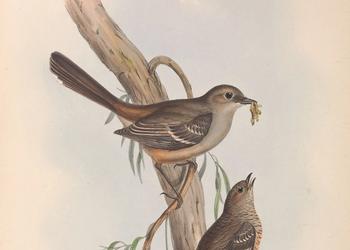
1866 - Source of the Wannon
Eugene von Guerard
Habitat: Greater Grampians - Rocky Outcrop Shrubland1
Least Concern 100% remaining2
Coloured lithograph (Plate 1 in Australian Landscapes)
H 39.2 x W 58.9 cm
The University of Tübingen
libraryofnature.com
Bioregion: Victorian Midlands (11% protected)3
An extensive area of foothills and isolated ranges comprising the lower inland slopes of the Great Dividing Range extending from North-eastern Victoria to Casterton in Western Victoria.
Large areas of the region were cleared during the gold rushes of the late nineteenth and early twentieth centuries so today it is characterised by patches of woodland and forest interspersed with a rural landscape with modified pastures and some cropping. Vegetation includes most of the Box Ironbark Woodland in Victoria, as well as substantial areas of Eucalyptus forests and woodlands with a grassy ground layer.
The flatter and more fertile areas of the Victorian Midlands have been substantially cleared for agriculture, principally sheep and beef cattle grazing. Timber harvesting remains an important land use in the Victorian Midlands. Much of the forests were extensively cut for timber to meet the demands of the gold mining industry of last century. In the less fertile parts of the Victorian Midlands, substantial areas of native vegetation remain today in good condition, for example, the Grampians National Park.4
Eugene von Guerard5
Johann Joseph Eugene von Guérard (17 November 1811 – 17 April 1901) was an Austrian-born artist, active in Australia from 1852 until 1882. Known for his finely detailed landscapes in the tradition of the Düsseldorf school of painting, he is represented in Australia's major public galleries, and is referred to in the country as Eugene von Guerard.
In 1852 von Guerard arrived in Victoria, Australia, determined to try his luck on the Victorian goldfields. As a gold-digger he was unsuccessful, but he did produce a large number of intimate studies of goldfields life, quite different from the deliberately awe-inspiring landscapes for which he was later to become famous.
By the early 1860s von Guerard was recognised as the foremost landscape artist in the colonies, touring Southeast Australia and New Zealand in pursuit of the sublime and the picturesque. He is most known for the wilderness paintings produced during this time, which are remarkable for their shadowy lighting and fastidious detail. Indeed, his view of Tower Hill in south-western Victoria was used as a botanical template over a century later when the land, which had been laid waste and polluted by agriculture, was systematically reclaimed, forested with native flora and made a state park.
Artwork of species found nearby

See more »
1854 - Superb Fairywren
Elizabeth Gould

See more »
1854 - Scarlet robin
Elizabeth Gould

See more »
1854 - Superb Fairywren
Elizabeth Gould

See more »
1854 - Eastern Yellow Robin
Elizabeth Gould

See more »
1854 - Red-capped robin
Elizabeth Gould

See more »
1854 - Southern Scrub-Robin
Elizabeth Gould